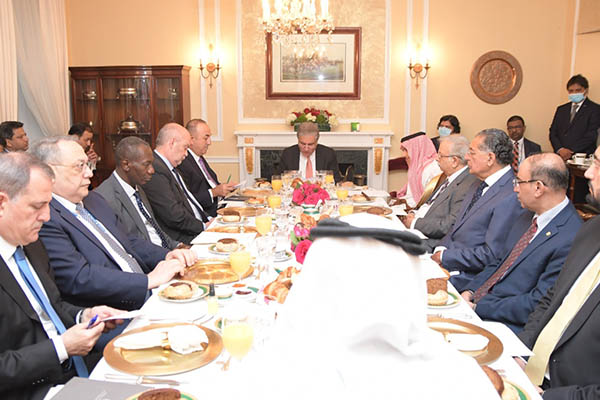
Photo courtesy Foreign Office
Joint statement of foreign ministers of OIC Contact Group calls upon global community to hold India accountable for human rights violations in disputed region
Reaffirming the right to self-determination of the people of Jammu and Kashmir in accordance with relevant U.N. Security Council resolutions, the foreign ministers of the Organization for Islamic Cooperation (OIC) Contact Group on Thursday stressed that settling the longstanding issues was essential for durable peace and stability in South Asia.
According to a joint statement issued after the meeting, which took place on the sidelines of the 76th session of the U.N. General Assembly in New York, OIC Secretary General Yousef bin Ahmad al-Othaimeen and the Independent Permanent Human Rights Commission shared a report on the Kashmir issue, while Foreign Minister Shah Mahmood Qureshi presented a briefing, and the participating foreign ministers and representatives of the Kashmiri people shared their views on the situation.
After deliberation, the OIC denounced the “unilateral and illegal” Indian steps of Aug. 5, 2019, as well as subsequent actions to alter the demographic makeup of the region by issuing 4.2 million domiciles to non-Kashmiri Indian citizens. “Indian actions are inconsistent with international law, applicable U.N. Security Council resolutions, and India’s own solemn commitments to implement UNSC resolutions,” it added.
The joint statement said the OIC had eulogized the legitimate struggle of Kashmiris for their right to self-determination, and condemned human rights violations committed since 1989, including the extrajudicial killings of 96,000 Kashmiris; widowing of 23,000 women; rape of 11,250 women and girls; orphaning of 108,000 children; destruction of 110,000 structures including schools and houses; and the discovery of over 8,652 unidentified mass graves.
The OIC foreign ministers also welcomed the meetings of the U.N. and the OIC Contact Group on Jammu and Kashmir over the past two years, as well as the role played by world leaders, parliamentarians, human rights organizations and international media in raising their voices against the atrocities in India-held Kashmir. They expressed “deep concern” that the COVID-19 pandemic had further worsened the humanitarian situation in India-held Kashmir, noting that their suffering had been exacerbated by lack of access to hospitals, and medicines.
Welcoming the mandate given by the 47th session of the OIC Council of Foreign Ministers in Niamey to the Humanitarian Department of the OIC Secretariat to examine and analyze the humanitarian situation in the disputed region, the meeting extended full support to the visit of the Assistant Secretary General for Humanitarian Affairs to Pakistan-administered Kashmir to “fully assess the situation and to present concrete recommendations to the 48th OIC Council of Foreign Ministers in Islamabad.” They also expressed condolences over the demise of Syed Ali Geelani and condemned the Indian government’s snatching of his body from his family and denial of his right to be buried as per his wishes.
The meeting also condemned the use of pellet guns and live fire-arms by Indian security forces; cordon-and-search operations; imprisonment of Kashmiri political leaders; fake “encounters”; and a “deliberate killing spree of Kashmiri youth” as a punitive tool to punish entire communities.
Indian actions
The joint statement called on India to reverse its “illegal and unilateral measures” of Aug. 5, 2019; stop the gross, systematic and widespread human rights abuses in India-held Kashmir; halt and reverse the illegal demographic changes in the occupied territory; allow unrestricted access to U.N. Special procedures, international media and independent observers to visit the disputed region; and take concrete and meaningful steps for the full implementation of UNSC resolutions on Jammu and Kashmir.
It said Delhi needed to conduct an independent investigation against well-documented cases of human rights violations including extra-judicial killings and sexual violence by Indian occupation forces. India should also, it said, allow the family of Syed Ali Geelani and Kashmiris to carry out his last rites in accordance with their wishes and Islamic traditions, and “immediately release” detained Kashmiri political leaders and youth.
The foreign ministers directed their respective Permanent Representatives in New York and Geneva to regularly brief the U.N. secretary general, presidents of the U.N. General Assembly and U.N. Security Council, president of the Human Rights Council and U.N. High Commissioner for Human Rights on the evolving developments in India-held Jammu and Kashmir.
